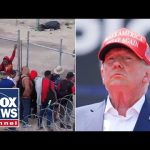President Trump’s blunt warning to the Nigerian government — that the United States will relist Nigeria as a “country of particular concern” and may cut aid or even take military action if it does not stop the slaughter of Christians — was a welcome return to muscle for a nation too often led by timid diplomats. For years conservative advocates have argued that American credibility depends on defending persecuted believers, and Trump’s move sent a clear message that the U.S. will no longer look away while Christian communities are being targeted.
Conservative leaders and religious freedom activists have rightly cheered the administration’s toughness, and institutions like the Heritage Foundation have been loud in calling for robust American pressure to protect Nigerian Christians and restore religious liberty. Too many in Washington talk compassion while trimming action, but relisting Nigeria and threatening real consequences forces policymakers and Abuja to confront the carnage happening on the ground.
Of course, Abuja predictably pushed back, insisting the violence is not a one-sided assault on Christians and warning against foreign meddling in Nigeria’s sovereignty. Washington should respect Nigerian independence, but that can’t be an excuse for inaction when evidence from multiple watchdogs and eyewitnesses point to sustained attacks on Christian villages and churches. The Nigerian government’s denials deserve scrutiny, not blind acceptance.
Conservative lawmakers in Congress have already moved to translate outrage into policy, demanding investigations, re-listing, and targeted measures against those who enable religious violence, and that pressure is working in the only way diplomacy often does: by threatening tangible consequences. If legislative initiatives compel a serious accountability mechanism and help funnel humanitarian and security aid to vulnerable communities, then the designation will have been more than rhetoric. America must use every lawful tool to protect the persecuted.
Some critics on the left and in international media charge Trump with theatrics or oversimplification, but the moral clarity here is essential. For too long global elites have treated religious persecution as a distant problem while Christians bleed in silence; conservative foreign policy recognizes that defending the persecuted is not charity, it is national character. Tough talk backed by action sends the right signal to both tyrants and allies.
There is a sober, practical side to this posture: if we are unwilling to back words with leverage, religious minorities will continue to pay the price. Sanctions, conditional aid, intelligence cooperation, and selective security assistance are the prudent steps to force real changes; if Nigeria cannot or will not protect its citizens, the United States must consider cutting ties with complicit actors and shoring up local defenders of religious freedom. That is not warmongering, it is responsibility.
Patriotic Americans who value faith, family and freedom should applaud a president who finally treats Christian persecution as a national interest, not a niche cause. Washington must keep the pressure until Nigerian leaders prove they will defend all their citizens, and conservative policymakers should turn this moment into sustainable policy that protects the vulnerable abroad and reasserts American leadership for persecuted believers everywhere. The choice is simple: stand up for the powerless now, or explain later why we did nothing.




